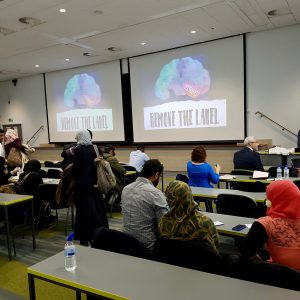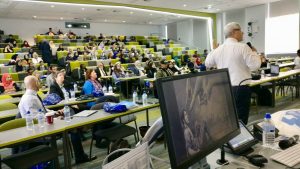On Saturday 18 March 2017, the University of Birmingham Medical School was host to FOSIS’s first ever mental health conference – “Remove the Label”. FOSIS (Federation of Student Islamic Societies) is an umbrella body representing Muslim students across the UK & Ireland. Supporting Islamic societies and the students trying to navigate their way through university, FOSIS runs many campaigns and projects through the year. November 2016 saw the launch of their latest campaign “Mind over chatter,” which aims to break the silence that still very much exists around mental health in the religious communities. A blog was set up for sufferers to share their stories, and soon came the conference, drawing students from every corner of the UK.
 The first talk of the day came from Dr June Jones, Senior Lecturer in Biomedical Ethics, who discussed the importance of learning to listen without judgment, setting the scene for the topics of the day. She shared her own experience in the aftermath of losing a baby, and finished with some inspiring quotes, such as “Never give up on someone with a mental illness; when ‘I’ is replaced by ‘we’, illness becomes wellness”, really highlighting the comfort to be found in community and peer support.
The first talk of the day came from Dr June Jones, Senior Lecturer in Biomedical Ethics, who discussed the importance of learning to listen without judgment, setting the scene for the topics of the day. She shared her own experience in the aftermath of losing a baby, and finished with some inspiring quotes, such as “Never give up on someone with a mental illness; when ‘I’ is replaced by ‘we’, illness becomes wellness”, really highlighting the comfort to be found in community and peer support.
Next came Professor Nasser Abdelmawla, a senior consultant psychiatrist who had travelled from Qatar for the occasion. His talk centred on misconceptions surrounding mental health in the Islamic community. Islam has always embraced the treatment of mental illness – perhaps even before the Western world – with the first ever psychiatric hospital being built in Baghdad in 705 CE. A story that he told about the monkey and fish stuck with me… In a season of flooding, the monkeys saw the fish and thought they were drowning. The monkeys attempted to pull the fish out of the water, a valiant effort to ‘save’ the fish. So convinced they were of their own good intentions, they could not comprehend why the fish did not wish to leave the water. An apt reminder that what we think is best for another person, may not always be what is genuinely best, and we should always make the effort to understand the other person’s situation and perspective.
Shaykh Abdul Hameed Ismail gave the next talk, focusing more on spiritual aspects to consider in recovery, whilst highlighting that to seek professional treatment is Islamic and highly recommended. Having seen the attitudes of numerous Muslims who consider any problem of the mind should be solved purely by strengthening one’s religion and spirituality, this was a refreshing attitude, and one to put at ease the sufferers who do seek therapy against other recommendations.
With such a packed morning, lunch was a welcome break and attendees were able to peruse numerous stalls. Inspired by art therapy, a calligraphy stall was present, fruit teas to further encourage relaxation, and, of course, a bit of retail and chocolate therapy with an abaya and chocolate waffle stall.
 Following lunch, an open panel discussion took place, with the audience being invited to ask questions of the speakers regarding any topic around mental health. Questions were asked ranging from the impact of the concept of masculinity on help-seeking behaviours, to mental illness in the workplace, to helping a friend with mental illness.
Following lunch, an open panel discussion took place, with the audience being invited to ask questions of the speakers regarding any topic around mental health. Questions were asked ranging from the impact of the concept of masculinity on help-seeking behaviours, to mental illness in the workplace, to helping a friend with mental illness.
The panel really emphasised the importance of getting help; to utilise the people and services available to us, as there is an ayah (verse) in the Quran that says, “Allah will not change the condition of a people until they change what is in themselves” [13:11]. This helped to dispel the myth sometimes seen in Muslim communities that mental illness can be cured by increasing in religiosity, instead of turning to outside help and taking active steps towards recovery. Furthermore, a question was asked about the permissibility of praying for someone who had died by suicide, as this is considered a sin in Islam. Shaykh Abdul Ismail brought home the point on this one, that we are in no position to judge on this matter, and to retain our humanity and pray for them as we would for any other.
The speakers then held a range of workshops for small groups, before a final talk was given by Dr Ahmed Hankir, recreating his famous talk “The Wounded Healer”. Having been lucky enough to see this talk at another conference, I watched the audience become astounded and captivated by his dramatic style, as he performed his way through numerous scenes from famous movies, as well as reciting prose and poetry. In and amongst his discussion of medicine and psychiatry, he told his own story of battling with bipolar disorder as a medical student, and how he rose from the pits of homelessness to becoming an esteemed psychiatrist. It was a fitting end to the day, truly bringing together all the messages of hope, and the role that psychiatry can play in the religious communities, with a shining example.
It was an amazing day, one that gave much reassurance that the Muslim community is finally starting to recognise mental illness as a problem; and legitimising help-seeking behaviours for it. The speakers were eloquent and very relevant, with several having suffered mental illness themselves. FOSIS and the Medical school’s Islamic Society truly pulled out all the stops to make this a possibility, and I hope their campaign continues to offer support and reassurance to those who need it most.
 Sabah Yasin is a third year medical student at HYMS with an interest in psychiatry. In her spare time she can be found with a pair of knitting needles.
Sabah Yasin is a third year medical student at HYMS with an interest in psychiatry. In her spare time she can be found with a pair of knitting needles.

